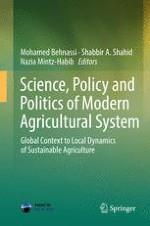2014 | OriginalPaper | Buchkapitel
10. Managing Degraded Lands for Realizing Sustainable Agriculture Through Environmental Friendly Technologies
verfasst von : Mirza B. Baig, Shabir A. Shahid
Erschienen in: Science, Policy and Politics of Modern Agricultural System
Verlag: Springer Netherlands
Aktivieren Sie unsere intelligente Suche, um passende Fachinhalte oder Patente zu finden.
Wählen Sie Textabschnitte aus um mit Künstlicher Intelligenz passenden Patente zu finden. powered by
Markieren Sie Textabschnitte, um KI-gestützt weitere passende Inhalte zu finden. powered by
